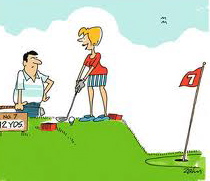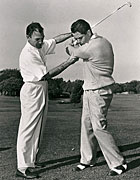 Except for those unfortunate few of us who, like moths attracted to a flame, find themselves drawn toward every new piece of reporting on the scandals at Penn State and Syracuse, most of us are sick and tired of hearing about so-called “coaches” who took advantage of their titles and positions to abuse young boys. I have no intention of adding to that miasma. I do, however, feel drawn to write about coaches, both good coaches and bad coaches.
Except for those unfortunate few of us who, like moths attracted to a flame, find themselves drawn toward every new piece of reporting on the scandals at Penn State and Syracuse, most of us are sick and tired of hearing about so-called “coaches” who took advantage of their titles and positions to abuse young boys. I have no intention of adding to that miasma. I do, however, feel drawn to write about coaches, both good coaches and bad coaches.
I see the job of a coach as helping people develop the skills they need to be successful. It doesn’t matter whether we are talking about coaching one person or coaching a team. Nor does it matter whether we are talking about coaches of sports teams or coaches in a business setting. A coach is a coach is a coach.
What does a good coach do? A good coach pumps you up. A good coach tells you you are special. A good coach shares information, and a good coach accents positives.
Contrast that to a bad coach. A bad coach brings you down. A bad coach tells you you are a failure. A bad coach withholds information, and a bad coach focuses on “wrongs.”

I have had some very good coaches and some very bad coaches. I have been a good coach, and at times I have been a very bad coach. My wife can attest that I am, for her at least, a horrible coach when it comes to her golf game – since I can’t seem to stop myself from pointing out all of the things that are wrong about the way she tries to play golf.
What I remember about my best coaches was that, while they were always pushing me to be “better” [and this is very important – we worked on getting better, not becoming perfect], they always helped me feel good about what I was doing, what I was learning, and how I was making progress. I felt that they truly cared about me as a person, and about helping me achieve what I was capable of achieving if I made a commitment and put in the effort to live up to that commitment.
The essence of good coaching seems to be the ability to surrender something of your sense of self, at least temporarily, and focus entirely on the needs of the person being coached, rather than on what you are trying to get for yourself out of the experience of coaching.
I often think about how Ronnie, my very best golf coach, used to work with me to improve my game. Ronnie never simply modeled a good golf swing and said, “Do it like that.” He worked hard to understand what kind of learner I was. It turns out I was a combination of a third-party visual and a kinesthetic learner. I had to be able to picture myself performing the physical action as if through a movie camera – rather than through my own eyes [third-party visual]; but I also had to have a strong sense of what things were supposed to feel like in a good golf swing [kinesthetic].
Analytic descriptions didn’t help me at all. But visual imagery and ideas about “feels” were powerful aids to helping me learn what a good golf swing would feel like to me. What seemed to help the most was that when Ronnie saw something he didn’t like in my swing, he didn’t try to “correct” me, he asked me what that swing felt like. Ronnie helped me internalize the learning and make it personal and meaningful to me. Swinging with “spaghetti arms” and “aiming my thumbs at my ears” were ideas that, under Ronnie’s watchful eye, helped me lower my handicap from 17 to 9 in under two years.
All of us have good coach and bad coach stories. I’d like to hear some of yours.

You should check out the article, “Personal Best,” that Atul Gawande had in the New Yorker a few months ago. He argues that even so-called experts in any field or discipline, not just athletes, can benefit from good coaching.
Kerry,
Thanks for pointing me tot a great article.
Here’s a link to “Personal Best“for those interested in reading it.
I totally agree with your comments. During my years at the Prudential I felt that the most important part of my job was coaching, and I knew that I had to get out of myself to do it properly, and get the best results.
John,
In the years I worked with you at Prudential, I saw you doing this time and again, with me and with others. You helped me get to results well beyond what I would have thought possible for myself.
First, let me say that you need to turn your “words of the day” into links to definitions. As soon as I finish this post, I will be Googling miasma!
I have been a coach in both a business setting (real estate) and a sports setting (boys softball). Like most coaches, sometimes I was effective and other times I was not. When coaching teams, in sports or in business, a good coach will make all of their players feel valued by celebrating their accomplishments in ways that recognize milestone moments. If you can also get your team to recognize the value of individual milestones to the overall team effort then you have done your job well. Not everyone is destined to be a superstar but everyone can improve in some small way.
What I have found from the experience of coaching is that you receive more than you give. The boys I coached were between the ages of 8-11 years old. Eddie was our star pircher and an all-around good athlete. At age 11, he learned he had a rare cancer when a tumor was discovered in his pitching arm. It seemed he would lose his arm until a doctor performed a first-ever operation in which the upper portion of Eddie’s arm was removed and the lower arm, from elbow to hand, was reattached to his shoulder.
The next summer Eddie wanted to return to the team to play but was not sure how he could contribute. The lost mobility in his pitching arm meant we needed to find a new position for him. The best option seemed to be first base as he could still catch a throw from his teammates and field grounders and fly balls but would not need to make any long throws of his own. Batting was a challenge but we worked with him and he developed a style of his own that allowed him to get the ball in play.
Towards the end of the season we were in a battle with our biggest rival for the playoffs and the game was very close. There was a baserunner on third when the batter hit a groud ball to the pitcher who moved off the mound to field it and made the out by throwing to Eddie at first base. The runner on third knew Eddie could not make a long throw and so he headed for home plate. Knowing his limitation, Eddie also started for home at full speed, determined to get there first and tag the runner. I will never forget the look of determination on his face. The baserunner got there first and scored and we went on to lose the game but our team celebrated anyway because Eddie had shown us what it meant to be a champion. Over the years I shared this story with other teams I coached to demonstrate that by focusing on the things we CAN do versus worrying about the things we can’t, we can all contribute and be our personal best. Some of the best victories, in life and in sports, don’t always come from a traditional “Win”. Even after so many years, Eddie’s story still inspires me and hope it will inspire your readers as well!
Margaret,
Thanks for sharing an inspiring story. This would make a great inspirational movie.
First I agree with Margaret, your words at times leaves me wondering what you are saying as I don’t know the meaning of the word. I do enjoy expanding my vocabulary but when reading want to know the meanings right away.
I have been coached and have coached.
My best coach was my CEO Larry Flick. His unbelievable belief and confidence in me drove me at all times to do my very best as failure was never an option. His belief in me was a gift that I needed to always reward. That modeling became the foundation of my coaching. I think it is the strongest aspect of coaching. Never to criticize rather suggest options. One of his greatest questions “Would you be interested in another point of view or perspective” always opened me up to new possibilites.
As I coach agents and managers and sometimes peers my first goal is to get them to see how much I believe in them and the work begins from there. At the end of every meeting I ask the question “Was this meeting good for you?” If the answer is yes I push them to share why it was good. If they say no, it creates an opportunity to revist the discussion and flush out where the miss was.
Recently I wsa working with a group and one member clearly began to struggle. I knew she could do the task at hand and just needed a calming influence and a warm smile which is exactly what she did need and she then performed beautilfully. Someone else in the group commented on my coaching and how it helped. To me it was simply letting the person know she could do it and take a breath and begin again.
David,
Thanks for the wonderful comment and tribute to a great coach. I have worked with Larry myself, and I am sure he is a terrific coach both for you and many other people.
As far as the language I use in my posts, I could punt this one and say, “I’m trying to get you to stretch your vocabulary.” Not the case. I just like the word “miasma.” It conjures, for me, a sticky, gooey mess. If I find myself falling in love with uncommonly used words in future posts, I’ll try to remember to put a link to a dictionary, so you can just click on it, rather than having to look it up later. We aim to please.
That would be awesome. I enjoy words as well but sometimes feel when I drop an unusual one the person hearing it may be put off, but keep pushing me.
When I was looking to merge my firm one of the main reasons was that Larry kept pushing “Growth and Development” Personal and Professional. I continue to push and grow!
You are such a blogger.